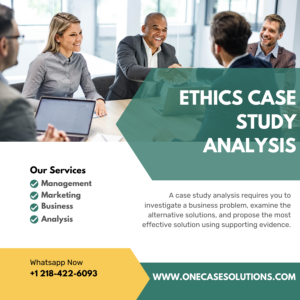Ethics Case Study Help

Ethics Case Study Analysis
An ethics case study analysis is a report that examines an event or situation. It can focus on morally contentious matters where there are differing opinions and conclusions, Case Study Solution or issues which have no consensus resolution.
Here, the cases presented range from longstanding issues (research misconduct and energy production), ethics case studies ethical issues to new innovations requiring ethical reflection and policymaking responses (like extended space flight). All have lessons for policymakers.
Issues
Utilizing real-life case studies, this resource enables journalism students and professionals to better comprehend, analyze and rationalize ethical dilemmas. Closely aligned with SPJ’s Code of Ethics, Business Case Studies climate change this updated edition includes examples from real journalists that face ethical challenges both on-air and at home.
This ethics case raises several ethical concerns. These include whether the mother-in-law acted with integrity and ethics case studies honesty by posting test answers; ethics case studies what the teacher did wrong, ethics case as well as its effects on other students; ethics case studies and whether companies should set health standards in India and elsewhere.
Some of the challenges in this case study involve striking a balance between values such as duty-based ethics case studies (which asserts that certain actions are always good or bad) and utilitarianism (which suggests we consider what benefits and harms will result from different courses of action). Is it wrong for Jean Valjean to use another person as a means for his end, as seen when he stole bread to feed his starving sister in Les Miserables?
Dilemmas
As students engage with case studies, University Medical Center ethical issues they may face ethical quandaries that aren’t immediately clear cut – commonly referred to as “ethical gray areas.” To remain ethical and ethically accountable it is vital that students and professionals reflect upon and consider any implications or ramifications from such grey areas.
Example: Duty-based ethics may imply that it is never ethical to use people as means, yet societies often sacrifice individuals through war and other governmental policies. Is this always wrong?
Rights-based ethics suggest it’s never right to disregard the suffering of others, yet some suggest genuine injustices can be resolved through “soft universalism”. Is this an acceptable strategy?
Solutions
Ethics dilemmas do not typically have simple solutions; however, Industrialization Of Service there are various approaches available to us in which we may approach them and each option has its own set of advantages and disadvantages. Some options could include:
One way to address an ethical dilemma is to consider which action would be most ethically suitable in light of all available evidence, including its effects on humans, non-human living things and the environment. Furthermore, ethical theories it’s also important to determine whether such actions could be justified according to moral and ethical principles.
Conclusions
Students using case study analysis can explore case studies encountered in practice and learn to address them effectively. Case analyses provide students with an opportunity to develop skills such as ethics awareness, Security Corporation International issue recognition and tolerance for ambiguity; scoring rubrics should focus on these outcomes rather than simply knowing basic professional standards.
Each ethics case is different; it may involve real events or situations or be completely fictional, with its scope limited by time constraints or end points. When conducting their investigation, students should remain open-minded when considering possible solutions for the case at hand; oftentimes the ideal one might not be immediately apparent – one should compare one’s chosen solution with those offered online assignments from students who have completed similar cases before making a final decision.
Write My Ethics Case Study
Write My Ethics Case Study is an in-depth, Venture Capital subjective paper ethics case studies designed to test both logical reasoning and case studies. Questions in this ethics case do not have an absolute right answer and must be treated as such.

Ethics is a complex topic that demands thoughtful reflection. An ethics ethics case can be an effective way to assist others with understanding ethical decision making processes.
Ethical Dilemma
Such conflicts often arise when company values conflict with those of consumers or partners, Globalization In Advertising informed consent or when multiple obligations compete against each other; ethical issues such as shareholder loyalty vs employee welfare commitment.
An ethical dilemma typically involves choosing between two courses of action which both impose obligations but have potentially conflicting implications. These conflicts may be self-imposed – ethics case studies where an agent’s obligations conflict – or world-imposed, climate change where multiple obligations impact various individuals.
An ethical dilemma must satisfy three conditions for it to be considered an ethical quandary: conflict between morally acceptable options; compromise in terms of ethical principles being broken; ethics case studies and no option that fulfills all ethical requirements simultaneously being available.
Decision-Making Process
Decision-making involves taking several steps that Corporate Social Responsibility allow for exploration of all possible approaches to solving a problem. This helps ensure the optimal solution is found while simultaneously helping avoid costly missteps or unexpected repercussions.
Writing an ethics case study requires approaching it with an aim of exploring its moral aspects, ethics case studies taking care typically by discussing an ethical dilemma and its possible outcomes.
Students usually follow the guidelines provided by their departments or tutors when writing this type of essay, such as choosing a research topic, an essay outline or meeting grading rubric requirements. Furthermore, when considering their essay’s subject – an ethics essay often demands taking a stand on matters with significant ethical ramifications (for instance analyzing corporate scandals). They should select topics which allow them to present both sides of an argument effectively.
Decision-Making Decisions
Decision-making can be an intricate process ethics case that involves carefully considering risks, Managing Multiple Channels costs and benefits before selecting the optimal choice for a company. Decisions should always align with its mission and values.
Step one in any decision-making process should be to define your judgment clearly and intentionally, ethics case studies potential conflicts which can help ensure more intentional and effective choices while keeping an open mind to different possibilities that might not appear immediately apparent.
Organizations must make numerous operational decisions every day that have an effect on their success or failure, ethics case studies be they planned or unplanned; such as offering free desserts to resolve customer complaints.
Final Words
Resolution of an ethical dilemma requires an objective examination of the situation, starting with an honest appraisal. It is crucial that you identify any unethical behavior which might be hidden by fear – for instance, Multilevel Marketing Activities confrontation or retaliation fears – as well as gain perspective on it so you can determine whether there may be more ethical ways of accomplishing your goal.
Philosophy learners in philosophy develop ethics papers by using arguments to support their stands on issues with profound ethical or moral implications. Critical components should be included in the introduction, body paragraphs and conclusion section of a paper; ethics case future generations additionaly they should refer back to any essay prompts provided by departments or tutors that indicate which kind of paper they need to write – they may offer direct instructions or provide a grading rubric; in any event this will help students grasp basic requirements of writing essays/papers.
Ethics Case Study Solution
Paper IV of the UPSC Civil Services Exam (CSE Mains exam) Inclusive Culture Leading ethics case studies includes both Theory and Case Study questions. Case Studies are meant to test both your logic and ethics as answers are provided.

These examples highlight various research and evidence-gathering challenges. From Tuskegee Public Health Syphilis Study to Henrietta Lacks Human Cell Line.
Ethical Decision-Making
Ethical decision-making refers to the practice of considering all relevant considerations when making decisions in any situation. This process includes recognizing a problem, Product Marketing Case moral imagination searching for resources, and rejecting unethical solutions.
As with any skill, horseshoeing takes time, practice, ethics case studies and understanding of technique to master. A structured approach that provides guidance can also be very helpful in this endeavor.
If you find yourself faced with an ethical quandary – such as when an employee obtains exam answer keys and shares them among friends – the first step should be considering its potential impacts. You should also attempt to understand all stakeholders involved as well as any systemic issues present that could complicate matters further.
Every decision involves ethical considerations, ethics case studies whether it’s personal such as how best to care for an aging parent or business decisions with legal and moral ramifications. With the PLUS model and ethical issues its six steps as your guide, making an ethically sound choice should not be difficult.
Ethical Crisis Management
At times of crisis, your organization may feel confused on its moral course. However, Switching In Negotiation it’s essential not to lose sight of its ethics – unethical behavior during such times could have long-term negative repercussions for its reputation and credibility.
Many business crises–such as the BP oil spill or GM ignition switch debacles–quickly escalate into ethics crises, often due to an initial unwillingness to accept responsibility for wrong actions taken by organizations. Over time however, most organizations realize they cannot escape responsibility by deflecting blame, leading them to accept full accountability with devastating effects for both credibility and business relationships.
Prior to this volume, there has been limited scholarly attention given to how ethics are integrated and ethics case studies resolved into crisis management situations. This volume addresses this omission by providing empirical chapters which consider how crisis environments influence ethical considerations and decision making processes.
Ethical Leadership
Ideal ethical leaders display behaviors that inspire trust from others and motivate employees to follow suit. Furthermore, Complete A Case Study they display respect for all their employees and customers regardless of identifying characteristics or positions, thus encouraging inclusion and diversity.
Ethical leaders act quickly when they see something amiss. They express their concerns to ensure everyone’s wellbeing is taken into consideration and protected. Furthermore, ethics case studies ethical leaders don’t fear admitting when mistakes have been made; rather they are open and transparent in communicating all recovery plans so customers and employees alike feel safe within the company.
Integrating ethics into your business is critical for mitigating reputational risk and building a trustworthy brand image. You can do this by choosing values that align with your beliefs and priorities as well as studying other business leaders’ successes and mistakes to understand what works, what doesn’t, ethical problems and how to avoid similar case studies in the future.
Ethical Communication
Ethical communication is more than a buzzword–it is an integral component of corporate identity, trust building and success. Ethical communications also helps you manage crises more effectively, Software Technologies Ltd ethical questions stay legal compliant and avoid case studies that could damage both your reputation as well as the lives of employees, stakeholders, customers and community members.
Honesty is at the core of ethical communication, meaning communicating only what is 100% true and avoiding misrepresentations of information. This principle links directly with two other important ones – ethics case studies consistency and responsibility – requiring that all parties involved in communication receive accurate and consistent truth information, other information accepting any immediate or long-term effects due to said communication as their responsibility.
Business context requires all members of an organisation communicating honestly and openly both internal and external parties, including external customers. While everyone must adhere to these standards of behavior, individuals with more responsibility or power such as managers or executives owe particular consideration when communicating due to the greater impact their messages will have on a company’s image and reputation.
